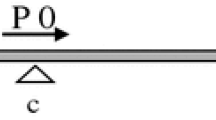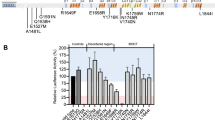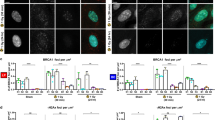Abstract
We have evaluated the transcriptional activation of a human p21 promoter reporter construct by transfection of BRCA1 expression constructs into tumorigenic and nontumorigenic human breast cell lines. Two cell lines with wildtype p53 (MCF-7 and MCF10A) demonstrated transcriptional activation of the p21 promoter by full-length BRCA1 (BRCA1L) as well as by two splice variants that lack most of exon 11 (BRCA1S and BRCA1S-9,10). In contrast, two cell lines with mutant p53 (MDA-231 and HCC1937) were inactive. Co-transfection of BRCA1L with BRCA1S or BRCA1S-9,10 exhibited synergistic p21 promoter activation, due to augmented expression of the cytomegalovirus promoter-based BRCA1 expression constructs. We examined the transcriptional activity of two known sequence alterations in BRCA1, one that results in a carboxy-terminal truncation of BRCA1 and is clearly pathogenic, and the other a missense mutation that is suspected of predisposing to cancer. Although both mutations have been shown to be defective in some assays of transactivation, we observed both mutations to be fully active in activation of the p21 promoter when incorporated in the full-length BRCA1L. In contrast, these mutations rendered BRCA1S inactive. These observations indicate that such transcriptional assays cannot serve as the basis for a functional appraisal of BRCA1 sequence alterations encountered in the course of genetic testing.










Similar content being viewed by others
References
Brzovic PS, Meza J, King MC and Klevit RE. . 1998 J. Biol. Chem. 273: 7795–7799.
Chai YL, Cui JQ, Shao NS, Reddy ESP and Rao VN. . 1999 Oncogene 18: 263–268.
Chapman MS and Verma IM. . 1996 Nature 382: 678–679.
Chen Y, Lee W-H and Chew HK. . 1999 J. Cell. Physiol. 181: 385–392.
El-Deiry WS, Tokino T, Velculescu VE, Levy DB, Parsons R, Trant JM and Lin D. . 1993 Cell 75: 817–825.
Frank TS, Manley SA, Olopade OI, Cummings S, Garber JE, Bernhardt B, Antman K, Russo D, Wood ME, Mullineau L, Isaacs C, Peshkin B, Buys S, Venne V, Rowley PT, Loader S, Offit K, Robson M, Hampel H, Brener D, Winer EP, Clark S, Weber B and Strong LC. . 1998 J. Clin. Oncol. 16: 2417–2425.
Futreal PA, Liu Q, Shattuck-Eidens D, Cochran C, Harshman K, Tavtigian S, Bennett LM, Haugen-Strano A, Swensen J, Miki Y, Eddington K, McClure M, Frye C, Weaver-Feldhaus J, Ding W, Gholami Z, Söderkvist P, Terry L, Jhanwar S, Berchuck A, Iglehart JD, Marks J, Ballinger DG and Barrett JC. . 1994 Science 266: 120–122.
Hayes F, Cayanan C, Barillà D and Monteiro ANA. . 2000 Cancer Res. 60: 2411–2418.
Jensen DE, Proctor M, Marquis ST, Gardner HP, Ha SI, Chodosh LA, Ishov AM, Tommerup N, Vissing H, Sekido Y, Minna J, Borodovsky A, Schultz DC, Wilkinson KD, Maul GG, Barlev N, Berger SL, Prendergast GC and Rauscher III FJ. . 1998 Oncogene 16: 1097–1112.
Klemp J, Brady D, Frank TS, Kimler BF and Fabian CJ. . 2000 Eur. J. Cancer [A] 36: 1209–1214.
Li S, Chen PL, Subramanian T, Chinnadurai G, Tomlinson G, Osborne CK, Sharp ZD and Lee W-H. . 1999 J. Biol. Chem. 274: 11334–11338.
Lu ML, Conzen SD, Cole CN and Arrick BA. . 1996 Cancer Res. 56: 4578–4581.
Magdinier F, Ribieras S, Lenoir GM, Frappart L and Dante R. . 1998 Oncogene 17: 3169–3176.
Miki Y, Swensen J, Shattuck-Eidens D, Futreal PA, Harshman K, Tavtigian S, Liu Q, Cochran C, Bennett LM, Ding W, Bell R, Rosenthal J, Hussey C, Tran T, McClure M, Frye C, Hattier T, Phelps R, Haugen-Strano A, Katcher H, Yakumo K, Gholami Z, Shaffer D and Stone S. . 1994 Science 266: 66–71.
Monteiro ANA, August A and Hanafusa H. . 1996 Proc. Natl. Acad. Sci. USA 93: 13595–13599.
Ouchi T, Monteiro ANA, August A, Aaronson SA and Hanafusa H. . 1998 Proc. Natl. Acad. Sci. USA 95: 2302–2306.
Pao GM, Janknecht R, Ruffner H, Hunter T and Verma IM. . 2000 Proc. Natl. Acad. Sci. USA 97: 1020–1025.
Rio PG, Maurizis JC, De Latour MP, Bignon YJ and Bernard-Gallon DJ. . 1999 Int. J. Cancer 80: 823–826.
Scully R, Ganesan S, Vlasakova K, Chen JJ, Socolovsky M and Livingston DM. . 1999 Mol. Cell 4: 1093–1099.
Seery LT, Knowlden JM, Gee JMW, Robertson JFR, Kenny FS, Ellis IO and Nicholson RI. . 1999 Int. J. Cancer 84: 258–262.
Shao NS, Chai YL, Shyam E, Reddy P and Rao NV. . 1996 Oncogene 13: 1–7.
Somasundaram K, Zhang HB, Zeng YX, Houvras Y, Peng Y, Zhang HX, Wu GS, Licht JD, Weber BL and El-Deiry WS. . 1997 Nature 389: 187–190.
Struewing JP, Hartge P, Wacholder S, Baker SM, Berlin M, McAdams M, Timmerman MM, Brody LC and Tucker MA. . 1997 N. Engl. J. Med. 336: 1401–1408.
Thakur S, Zhang HB, Peng Y, Le H, Carroll B, Ward T, Yao J, Farid LM, Couch FJ, Wilson RB and Weber BL. . 1997 Mol. Cell. Biol. 17: 444–452.
Thompson ME, Jensen RA, Obermiller PS, Page DL and Holt JT. . 1995 Nature Genetics 9: 444–450.
Tomlinson GE, Chen TTL, Stastny VA, Virmani AK, Spillman MA, Tonk V, Blum JL, Schneider NR, Wistuba II, Shay JW, Minna JD and Gazdar AF. . 1998 Cancer Res. 58: 3237–3242.
Wang HC, Shao NS, Ding QM, Cui JQ, Reddy ESP and Rao VN. . 1997 Oncogene 15: 143–157.
Welcsh PL, Owens KN and King MC. . 2000 Trends Genet. 16: 69–74.
Wilson CA, Payton MN, Elliott GS, Buaas FW, Cajulis EE, Grosshans D, Ramos L, Reese DM, Slamon DJ and Calzone FJ. . 1997 Oncogene 14: 1–16.
Wilson CA, Ramos L, Villaseñor MR, Anders KH, Press MF, Clarke K, Karlan B, Chen JJ, Scully R, Livingston D, Zuch RH, Kanter MH, Cohen S, Calzone FJ and Slamon DJ. . 1999 Nature Genet. 21: 236–240.
Xu X, Weaver Z, Linke SP, Li C, Gotay J, Wang XW, Harris CC, Ried T and Deng CX. . 1999 Mol. Cell 3: 389–395.
Yu X, Wu LJC, Bowcock AM, Aronheim A and Baer R. . 1998 J. Biol. Chem. 273: 25388–25392.
Zhang HB, Somasundaram K, Peng Y, Tian H, Zhang HX, Bi DK, Weber BL and El-Deiry WS. . 1998 Oncogene 16: 1712–1721.
Acknowledgements
We thank Dr R Jensen and Myriad Genetics, Inc. for BRCA1 cDNA plasmids, Dr J Gudas for cells, Dr B Vogelstein for the pWWP-Luc plasmid, and Genentech, Inc. for the RK7 expression plasmid. We are grateful to Karen Douville and Kristen Doherty for assistance and advice. This work was supported by a grant from the National Cancer Institute (R01 CA-77772), and is dedicated to the memory of Tania C St John.
Author information
Authors and Affiliations
Rights and permissions
About this article
Cite this article
Lu, M., Arrick, B. Transactivation of the p21 promoter by BRCA1 splice variants in mammary epithelial cells: evidence for both common and distinct activities of wildtype and mutant forms. Oncogene 19, 6351–6360 (2000). https://doi.org/10.1038/sj.onc.1204025
Received:
Revised:
Accepted:
Published:
Issue Date:
DOI: https://doi.org/10.1038/sj.onc.1204025
- Springer Nature Limited
Keywords
This article is cited by
-
RBBP8/CtIP suppresses P21 expression by interacting with CtBP and BRCA1 in gastric cancer
Oncogene (2020)
-
Transactivation of the estrogen receptor promoter by BRCA1
Cancer Cell International (2017)
-
BRCA1 and its phosphorylation involved in caffeine-inhibitable event upstream of G2 checkpoint
Science China Physics, Mechanics and Astronomy (2010)
-
BRCA1a has antitumor activity in TN breast, ovarian and prostate cancers
Oncogene (2007)
-
Normal lymphocyte development and thymic lymphoma formation in Brca1 exon-11-deficient mice
Oncogene (2003)




